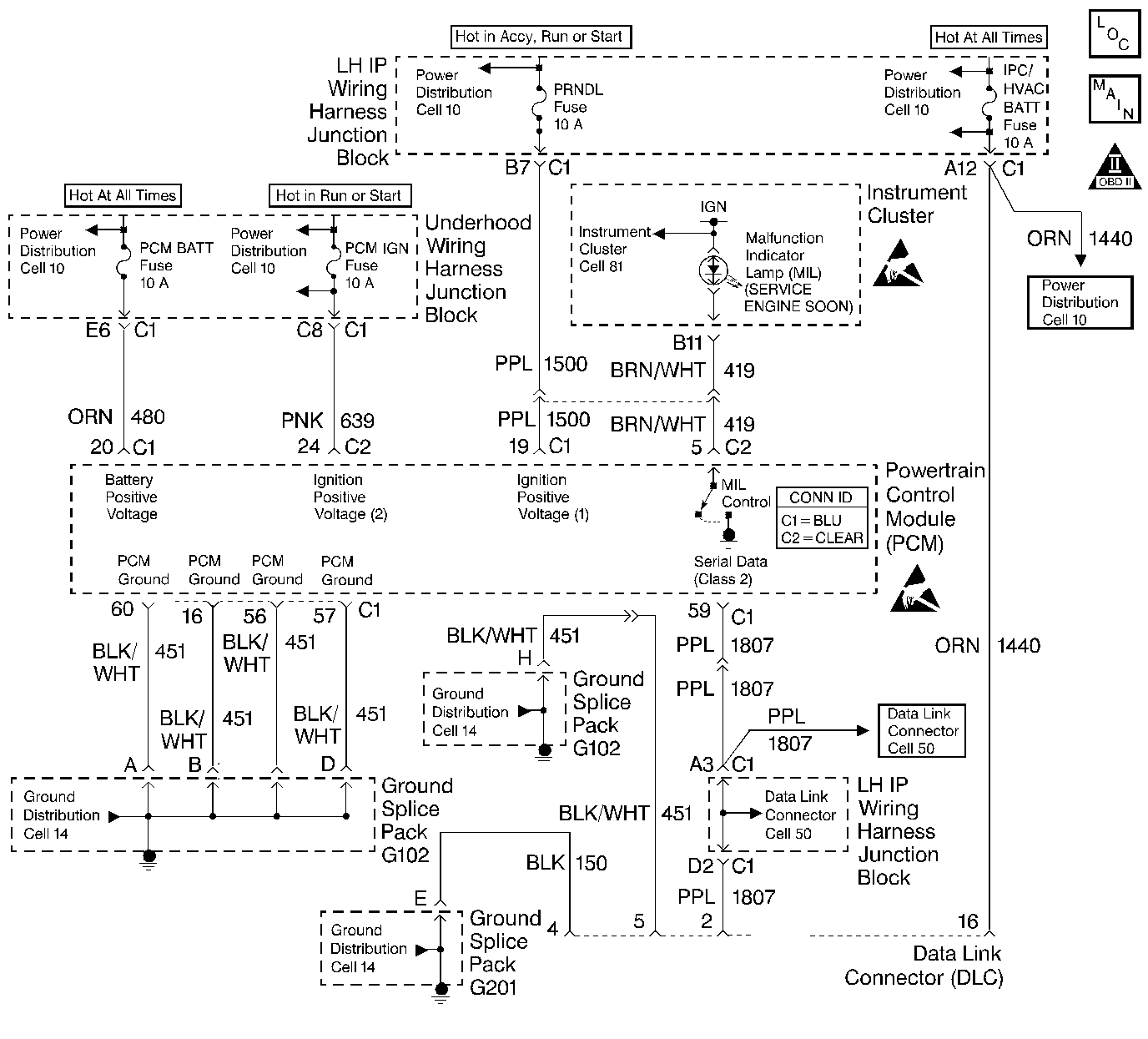
Circuit Description
The Powertrain On Board Diagnostic (OBD) System Check must be the starting point for any driveability complaint diagnosis. Before using this procedure, you should perform a careful visual/physical check of the PCM and engine grounds for being clean and tight. Refe to Visual/Physical Check in Intermittent Conditions . The Powertrain On Board Diagnostic (OBD) System Check is an organized approach to identifying a problem created by an electronic engine control system malfunction. No MIL with the key on, engine not running and DTC P1671 Malfunction Indicator Lamp (MIL) Control Circuit set suggests an open in the MIL driver circuit.
Diagnostic Aids
An intermittent may be caused by a poor connection, rubbed through wire insulation or a wire broken inside the insulation. Check for the following items:
| • | Inspect the PCM harness and connectors for improper mating, broken locks, improperly formed or damaged terminals, poor terminal to wire connection, and damaged harness.Refer to Intermittents and Poor Connections Diagnosis and Connector Repairs |
| • | If the engine runs OK, check for a faulty lamp bulb, an open in the MIL driver circuit, or an open in the instrument cluster ignition feed. |
| • | If the engine cranks but will not run, check for an open PCM ignition or battery feed or a poor PCM to engine ground. Refer to Wiring Repairs . |
Test Description
The numbers below refer to the step numbers on the Diagnostic Table:
-
A no MIL condition accompanied by a no start condition suggests a faulty PCM ignition feed or battery feed circuit.
-
Using a test light connected to battery positive voltage, probe each of the PCM ground terminals to ensure that a good ground is present. Refer to PCM Terminal End View for terminal locations of the PCM ground circuits.
-
This vehicle is equipped with a PCM which utilizes an Electrically Erasable Programmable Read Only Memory (EEPROM). When the PCM is being replaced, the new PCM must be programmed. Refer to Powertrain Control Module Replacement/Programming .
Step | Action | Value(s) | Yes | No |
|---|---|---|---|---|
1 | Was the Powertrain ON-Board Diagnostic System Check performed? | -- | ||
Attempt to start the engine. Does the engine start? | -- | |||
3 | Check the fuse for the instrument cluster ignition feed circuit. Is the fuse OK? | -- | ||
4 | Turn the ignition ON, probe the ignition feed circuit at the cluster connector with a test light to ground. Is the test light ON? | -- | ||
5 |
Is the MIL ON? | -- | ||
6 | Check the PCM ignition feed and battery feed fuses. Are both of the fuses OK? | -- | ||
7 |
Is the test light ON? | -- | ||
8 | Probe the battery feed circuit at the PCM harness connector with a test light to ground. Is the test light ON? | -- | ||
Was a problem found? | -- | |||
10 |
Was a problem found? | -- | ||
11 |
Was a problem found? | -- | ||
12 | Repair open in the ignition feed circuit to the instrument panel indicators. Is the action complete? | -- | -- | |
13 | Locate and repair open in PCM battery feed circuit or PCM ignition feed circuit as necessary. Is the action complete? | -- | -- | |
14 | Locate and repair short to ground in PCM ignition feed circuit or PCM battery feed circuit as necessary. Is the action complete? | -- | -- | |
15 | Locate and repair short to ground in the instrument panel indicators ignition feed circuit. Is the action complete? | -- | -- | |
|
Important: Replacement PCM must be programmed. Replace the PCM. Refer to Powertrain Control Module Replacement/Programming . Is the action complete? | -- | -- | ||
17 |
Was a problem found? | -- | Go to Diagnostic System Check - Instrument Cluster in Instrument Panel, Gauges and Console |
